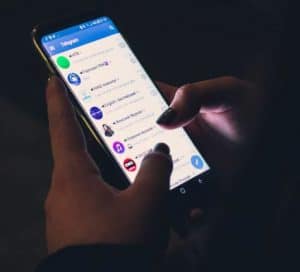We hope you love the product we recommend! Just so you know, at no extra cost to you, we may get a small commission for purchases made through links in this post. Your support is appreciated. Enjoy the read!
Have your friends ever asked you what you meant in your 4 am text to them?
Only to not remember sending it at all?
‘Does sleep texting exist? Is it a real thing?!‘ you might wonder. How can someone unlock their phone, select a recipient and send a message while asleep?
It definitely happens – truth is stranger than fiction, my friend.
Move over sleep-talking and sleep-walking – there’s a new trend in town now!
Facts about sleep texting
Here are a few key facts about sleep texting:
Sleep texting is a form of parasomnia, or abnormal behavior that occurs during sleep. It is similar to sleepwalking in that it is an activity that a person may engage in while they are in a state of sleep, but are not fully aware of their actions.
Sleep texting is relatively rare, but it is thought to be more common in younger people who are more likely to use their phones before bed.
It is not clear exactly why some people are more prone to sleep texting than others, but it is thought that certain factors, such as stress, sleep deprivation, and the use of electronics before bed, may increase the risk.
Sleep texting can have consequences beyond just sending strange or nonsensical messages. A person who is sleep texting may also be at risk of accidentally sending inappropriate or embarrassing messages, or of engaging in other dangerous behaviors such as sleep driving.
If you or someone you know is experiencing sleep texting, it may be helpful to speak with a healthcare professional or a sleep specialist to determine the cause and find ways to manage the behavior. In the meantime, it can be helpful to reduce the use of electronics before bed, establish a regular sleep routine, and practice relaxation techniques to promote a healthy sleep environment.
Sleep Texting – What is it?! Is it real? Is it Bad for Your Health?

Sleep texting is literally using your mobile phone to text while you’re asleep.
Usually, the unconscious person is responding to a text message notification, but they can also be initiating.
Most often it happens when you have easy access to your smartphone at night. For example, if you sleep with your phone in bed.
Never heard of it? It’s a growing phenomenon.
One study in the Journal of American College Health states that a growing number of college students text in their sleep and don’t even remember doing so.
They surveyed over 370 students and 25% text in their sleep. Unfortunately for the ladies, this affects them more than men.
Sleep Texting Causes, Condition & Meaning
Are you wondering “why do I text in my sleep?”
Actually, there are a number of reasons why. Maybe one or more below is causing your sleep texting disorder!
1. Parasomnia
Parasomnia is a sleeping disorder that involves unwanted behaviors while that person is asleep.
For example, people might talk, eat or even drive while sleeping. So, really sleep texting is on the less dangerous side of the scale.
Funnily enough, parasomnia, like sleep walking, sleep cooking, sleep sexing, typically happens during Stage 3 of the sleep cycle – deep sleep!
Essentially, you’re not aware of your surroundings and your body has overridden the necessary sleep paralysis from acting out your dreams.
Fun Fact: According to the National Sleep Foundation, about 10 percent of Americans have parasomnia.

2. Genetics
If you have a family history of sleeping disorders, then you’re also at a greater risk. While it can happen to people at any age, children are affected the most often.
If you experience parasomnia during adulthood, it may be caused by an underlying condition.
3. Underlying Condition
A myriad of underlying conditions can contribute to parasomnia like sleep texting.
It could be obstructive sleep apnea, substance or alcohol use, certain medications (like antidepressants and antipsychotics), or even restless leg syndrome can disrupt your sleep.
Needless to say, but being sleep-deprived or regularly having your sleep interrupted certainly won’t help you.
4. Stress
This is a big one!
We all deal with stress differently. Some people act it out in their sleep.
When both your body and brain are completely stressed out, getting into and staying in deep sleep can be challenging.
You know, when you have a hectic schedule during the day, your brain may not completely shut down at night.
Hate to break it to you, but if you use your smartphone a lot for work and it’s stressful, there may be a greater chance that you’d sleep text!
Sleep Texting Examples
According to Text Request,
“On average, Americans send and receive about 94 text messages per day.”
I think that number is pretty conservative – I text way more than 100 times a day!
We’re so used to talking through written communication that texting in our sleep naturally developed over time.
You can search up examples on Instagram or Twitter using #sleeptexting.

The Trouble with Sleep Texting – Negative Side Effects
Didn’t think there would be negative side effects to sleep texting?
Think again!
It may seem hilarious at first to see incoherent messages you unconsciously sent out at night, but sleep-texting has negative side-effects.
1. Embarrassment & Misunderstanding

This is an obvious one.
Even if it’s usually just a bunch of gibberish, it’s awkward and embarrassing.
Especially if you sent the text to the wrong person.
Imagine if you were sleep texting love messages to an ex or to a new beau that you’re trying to play it cool in front of.
Or, worse, your boss that you’re trying to impress for that upcoming promotion opportunity!
Whatever the case, your unintentional text may cause unwanted misunderstanding or conflict.
2. Disorder Worsens if Untreated
While sleep texting may be considered harmless, it can be worrisome if it happens pretty often.
After all, it can be a symptom of a more serious condition. It could be sleep-related, but not necessarily.
So, it’s important to visit your doctor when you first notice that something’s off. The earlier the better.
Or even worse, you have no condition to fix, sleep texting just turned into a bad habit!
3 Steps to Prevent Sleep Texting Disorder
The first step is admittance. The next step is…well, to stop.
Not sure how? Keep reading!
1. Put Phone Out of Reach
Put it in the farthest corner in your room, especially at night while you’re sleeping.
Don’t sleep with your phone. Come on now.
This is one of the most effective and simplest solutions out there is.
You can trust that you’d be too tired or lazy (like me!) to want to get out of bed just to check your messages. It can wait until the morning…
Turn off the buzz or sound notification. Or put it on airplane mode – that’s what I do when I’m charging overnight.
Better yet, turn off your phone completely! This way, it’s one more barrier (turning it on) for you to sleep text.
Even better – don’t charge your devices next to your bed where you can easily reach for it. In fact, keep all electronics outside of the bedroom!

2. Get Enough Sleep
We tend to experience these odd behaviors more often when we’re sleep deprived.
These parasomnia scenarios are usually more frequent when you don’t get enough rest.
This is especially true for me when I have busy days and important meetings.
I remember laughing or talking myself awake in the middle of the night a few times. It’s actually an interesting experience!
So, try to develop good sleep hygiene. You know, the standard – don’t stay up too late, go to bed at a reasonable time, establish a good morning and evening routine.
A good full 7-9 hours of sleep should do it, but your sleep cycle may be longer or shorter.
I’ve experimented on myself many times – I typically need 10 hours of rest in order to wake up feeling refreshed without an alarm clock.
3. Train Yourself to Text Back Later
You can practice texting back later when you’re awake. This way it can be turned into a habit.
In modern society, people usually check and reply right away.
Even when it doesn’t require a response right away, and you know that doing so will disrupt your flow.
In many cases, it may be quite beneficial to wait before texting back. Especially if emotions are involved. Always sleep on it!
Hopefully, after training your conscious self to not text back right away.
This habit will carry over to your unconscious mind when your sleep texting parasomnia hits you at night.
Can you text in your sleep
It is possible for a person to text in their sleep, although it is rare and not well understood. This phenomenon, known as “sleep texting,” occurs when a person sends text messages while they are in a state of sleep.
Sleep texting is similar to sleepwalking in that it is a form of parasomnia, or abnormal behavior that occurs during sleep. Sleepwalking and sleep texting are both examples of activities that a person may engage in while they are in a state of sleep, but are not fully aware of their actions.
There are a few different ways that a person may text in their sleep. In some cases, the person may be able to text normally, as if they were awake, although the messages may be nonsensical or unrelated to the conversation at hand. In other cases, the person may send incomplete or garbled messages, or may repeat the same message multiple times.
It is not clear exactly why some people are more prone to sleep texting than others, but it is thought that certain factors, such as stress, sleep deprivation, and the use of electronics before bed, may increase the risk.
It is important to note that sleep texting can have consequences beyond just sending strange or nonsensical messages. A person who is sleep texting may also be at risk of accidentally sending inappropriate or embarrassing messages, or of engaging in other dangerous behaviors such as sleep driving.
If you or someone you know is experiencing sleep texting, it may be helpful to speak with a healthcare professional or a sleep specialist to determine the cause and find ways to manage the behavior. In the meantime, it can be helpful to reduce the use of electronics before bed, establish a regular sleep routine, and practice relaxation techniques to promote a healthy sleep environment.
Sleep Texting FAQ
Got more questions about sleep texting?
Check out some of the frequently asked questions below!
Can you text people in your sleep? Can you sleep and text at the same time?

Yes, you can text people in your sleep.
Sleep texting is a known parasomnia sleep disorder where you use your mobile smartphone to send text messages while asleep.
According to different studies, sleep texters are more often replying to a message, but can also initiate an SMS.
Typically, it happens when the cell phone is within reach and easily accessible. So, try not to sleep with it on the bed at all.
What causes sleep texting? Why do I text in my sleep?
Causes of sleep texting, especially during adulthood, may be attributed to underlying conditions like:
- Other Parasomnias – like sleepwalking & sleeptalking
- Genetic Predisposition
- Use of alcohol, drugs or medication
- Obstructive sleep apnea
- Stress
What is a parasomnia sleep disorder?
Parasomnia sleep disorders are conditions like:
- sleepwalking,
- sleeptalking,
- sleeptexting,
- sleepeating,
- insomnia,
- night terrors and many more.
It usually happens during full or partial arousal from REM stage (dream state) or Stage 3 (deep sleep) of the sleep cycle.
When did texting begin? When was texting first widely used?
The first text message was sent in 1992, but it wasn’t until the early to mid-2000s was it widely adopted. Fast forward to today, we can’t image our daily lives without it.
Here’s a Brief History on Text Messaging
- 1984 – SMS concept developed by Friedhelm Hillebrand from Deutsche Telekom & Bernard Ghillebaert from France Telecom while working on a Franco-German GSM cooperation
- 1992 – First text message sent on December 3 from Neil Papworth, a developer at Sema Group Telecom (now Mavenir Systems), to Richard Jarvis at Vodafone. His Orbitel 901 handset didn’t have a keyboard so they had to type it on a computer. The first text ever sent said “Merry Christmas”.
- 1994 – Nokia 2010 was the first mobile phone to support SMS messaging
- 1995 – On average, only 0.4 messages were sent per month per GSM customer
- 2000 – 5 years later, the average rose to 35 per user per month
- 2006 – 205+ million texts were sent in UK alone
- 2010 – 6.1 trillion SMS messages were sent – that’s 193000 every second
- 2019 – 23 billion are sent daily; 6 billion are sent in the US alone
What does SMS mean? What is the difference between text and SMS?
Text and SMS are the same thing – they can be used interchangeably.
SMS is short for Short Message Service and is a widely used type of text messaging. You can only send up to 160 characters in an SMS.
Any longer and it would turn into an MMS (Multimedia Messaging Service) where the messages are split up and sent as multiple messages.
Today, many people using mobile apps to send and receive messages. Some popular ones are:
- iMessage
- Line
- Viber
- Facebook Messenger
These do not break up your message based on the number of characters like a traditional SMS, but you would need an internet connection.
This is common in countries where data plans are more affordable and would cost extra to send an SMS.
There you go.
Now that you’ve learned how to stop sleep texting, it’s time to put them into practice.
Happy Sleeping!
>>Want to know about the best mattress for sciatica? Find out here! <<






